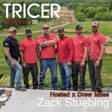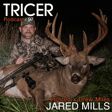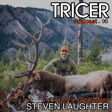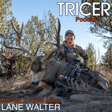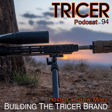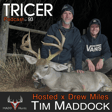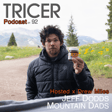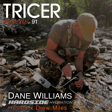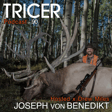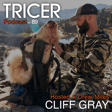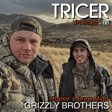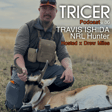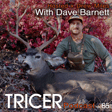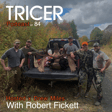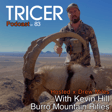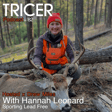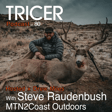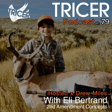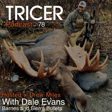Become a Creator today!Start creating today - Share your story with the world!
Start for free
00:00:00
00:00:01

Passing On The Knowledge Of Hunting – Steve Turigliatto
This week on the Tricer Podcast, Drew has Steve Turigliatto on to talk about hunting in California. Steve talks about getting starting hunting “back in the day” and how he is trying to pass on the knowledge he learned over the years to the next generation. They also dive deep into the turkey population in California and when they were reintroduced. These guys go way beyond the borders of California in the discussion to discuss hunting across the west and how it has changed.
TRICER USA
Website – https://tricerusa.com/
Instagram - https://www.instagram.com/tricerusa/
Facebook - https://www.facebook.com/tricerusa/
YouTube - https://www.youtube.com/@tricer6985
Transcript
Introduction and Steve's Background
00:00:01
Speaker
You are listening to the Tricer podcast, where we talk all things hunting, gear, and the great outdoors. Before we begin, let's start things out right and put God first. Lord Jesus, I thank you for Tricer, and I ask that you can use this podcast as a way to bring joy to all of our listeners.
00:00:17
Speaker
We lay Tricer and this podcast at your feet. Amen. Steve Turgliato, welcome to the Tricer podcast. Excited to have you on, my friend. Thank you, Drew. it's It's great to be here.
00:00:28
Speaker
So Steve is – Steve, are you 75 now? or yet I'll be 77 on opening day of turkey season. 27th. March 29th, yeah. And still out there.
00:00:39
Speaker
Steve is still traveling all over the West, um hunting turkeys in Utah every year, traveling to Montana and Canada every year. i mean, just – uh, just somebody who this truly loves, especially the wing shooting. I know he loves deer too, but has this been a, but when it comes to San Diego, Turkey and NWTF, Steve has been just such a huge person in that movement and bringing birds here and keeping the, keeping the birds here. Cause California doesn't want them. If California had their way, they're not putting them back in.
00:01:10
Speaker
um and Steve has just been, you know, and that, and then also the youth stuff that Steve does is just incredible. So, um, yeah, Steve Trugliato. Yeah. Thank you. Thank you, Drew. Yeah.
00:01:21
Speaker
yeah It's a,
Passing on the Hunting Tradition
00:01:22
Speaker
it's a passion. And, and I hope as all of us get older um it's, it's pretty much about passing it on now.
00:01:31
Speaker
ah I mean, don't get me wrong. I still like pulling the trigger, but ah I enjoy probably far more watching somebody else. ah Our youth Turkey hunts here in San Diego County, which, you know,
00:01:46
Speaker
are a miracle that we're able to hunt the county um and city properties that we have. And um it is it's one of the most exciting things you can do is to watch a ah kid shoot their first turkey or their first deer, first anything, you know, waterfowl.
00:02:06
Speaker
and And that's really what I like these days. i mean, it's it kind of where it's at. yeah Yeah, you definitely do I see you out there with old automatic, man. just Kids just pounding them, just...
00:02:19
Speaker
he He has got a passion for for hunting. There's no doubt about it. Gosh, he he got three turkeys last year. hunted waterfowl ah more this this year together.
00:02:32
Speaker
And I mean, doves, pit it it doesn't matter. He's a shotgun guy, um probably because he's old enough now. He's 14. So he's old enough to start hunting big game. And I venture to say by next, this coming season, I'll have him into deer hunting as well.
00:02:50
Speaker
Yeah. Yeah. So that's just a local kid. um i believe the story is single mom, right? Well, he's his mom's remarried, but the the new husband doesn't hunt. His father did hunt in fish, um but he ah his new stepdad doesn't hunt. So his mom, who is just...
00:03:08
Speaker
An incredible mom. she She gets up at 1.30 in the morning but take to take him to San Jacinto Wildlife Area, to Worcester, all these different places. And um she's a great mom, is all I got to say.
Hunting in the 1950s vs. Today
00:03:22
Speaker
Yeah, she she goes with him a lot.
00:03:25
Speaker
Yeah, it's it's cool to see that. And one cool thing about that kid too, um this whole podcast isn't about auto, but seeing a kid who is teaching himself to call and and getting himself out there, it's very similar to when I was a kid, that right? Like no one took me hunting. I went got my own hunting license at 13 kind of like forced my way into my friend's parents' hunting trips to go hunt birds in the valley, you know, in El Centro, or and i shot my first fez in and I kind of just figured it out on my own.
00:03:52
Speaker
And where i look at my kids, and I'm not knocking my kids. I mean, my 16 year old is going to far succeed me in hunting. He's a phenomenal hunter, but they've kind of been like just brought along and it's neat to see a kid go out and do that. And the reason why he's able to do that mostly is in part to what NDWTF is doing and some of the other things we're doing in San Diego with youth shooters.
00:04:14
Speaker
Yeah. I, I, I think that, you know, having the youth, um experienced what, especially me, I mean, I'm 77.
00:04:25
Speaker
I was raised in Southern California and I've had many people ask me, gosh, how do you know so much about hunting and fishing? and Well, In 1950s, this didn't look like this. I mean, our kind of you know this area was full of ponds. You could shoot all over the place.
00:04:43
Speaker
ah you know People, believe it or not, carried guns in their rack of their cars and trucks ah um in high school. um I was raised in Long Beach, but ah Cyprus and in ah Cerritos and areas like that were called Dairy Valley.
00:05:01
Speaker
And it was all dairies and wildland. ah Where Disneyland is today was orange groves. And hence Orange County. And so I had hunting all around me and I could ride my bike and fishing all around me. And so ah my dad belonged to a hunting and fishing club. My dad is from Kansas. My mom's from Oklahoma. Both hunting families. And, so I got to experience at a young age and I was pretty much raised in it.
00:05:32
Speaker
Kids today have peer pressure. I mean, just say you're hunting or killing something, you know, you know, makes a lot of them cringe. And so auto is the exception.
00:05:44
Speaker
Um, but I can say, even when I was in high school, I had very few friends that hunted. A lot of them fished, but very few hunted. And um so I think just our society in general, that's been kind of the the way it's been even since ah our country was first discovered.
00:06:03
Speaker
There were the hunters and then there were the gatherers, you know. And so, yeah, we're a breed that we like to hunt, you know, and and provide.
00:06:14
Speaker
so yeah We should kind of talk. we We have no agenda for this pod today. and and you asked what we want to talk about. i was like, oh, we'll just figure it out. ah You know, there is this cycle in life, right, where you you you start and you just want to go kill something and want to go hunting. And then you kind of want to learn how to big, like, shoot, you know, big animals. And then you want to go to, like, the giving back. And that's kind of where you are now, obviously, right? I think I'm i'm there. i still like to kill stuff, but um yeah I do like taking people out.
00:06:41
Speaker
But let's kind of talk about, like... mean, the fifties and hunting. Let's talk about the Sierras without what that was like. And Steve, if you ever follow Steve, like on Facebook, you should follow him on Facebook or even on like one a local hunting forum here.
00:06:53
Speaker
Steve is the guy that has the pictures of the old Jeeps with gear on the back and everybody in the flannels. Right. And Steve's in a flannel and jeans and they're up in the Sierras shooting giants. So let's talk about that. Let's talk about like hunting back in the fifties and we'll kind of work our way up here.
00:07:08
Speaker
Yeah. So, I shot my first deer in 1959, um, in the Sierras. Um, I was at the headwaters of the, uh, uh, that would be the West Walker river out of Bridgeport.
00:07:22
Speaker
Um, which is now X nine a in those days you went and bought a deer tag. I mean, simple as that. You, we didn't have turners, but we had sporting goods stores and, and, uh, you just purchased the deer tag and, uh, you could hunt anywhere in the County.
00:07:41
Speaker
Um, ah or or I'm sorry, in the state. And so if you didn't get a deer in the Sierras, in the management part of it was there were seasons. And so the Eastern Sierras historically has opened the last or next to last Saturday of September through the first Sunday or second Sunday of October. Even back then, huh? Yeah. Oh, well, it's the same today. that's Same today.
00:08:07
Speaker
And so what – you know, made good seasons and bad seasons were either early snows or, you know, or no snow at all or dry years. And, and so the animals themselves stayed super high. The guys that were hardcore and could walk, um,
00:08:27
Speaker
they would, you know, shoot more quality bucks. The years that we had big snows early, then a lot of big bucks were taken. And so nature kind of took care of itself.
00:08:38
Speaker
If you didn't get a deer there, then you could hunt in San Diego County, Riverside County, anywhere you wanted in the state of California, just, just with owning a deer tag, this micromanaging that we have today,
00:08:53
Speaker
ah they you know they say that, well, there's more people, so we have to manage closer. Well, I
Deer Management and Regulations
00:09:01
Speaker
beg to differ a little bit. I think there were many more hunters in the fifties and sixties. That was a way of life for many people. And the opening day in the Sierras was an event.
00:09:12
Speaker
I mean, it was like dove in the valley. It was like dove in the valley. I mean, all you could see were plaid red everywhere. you know, we didn't have blaze orange in those days. And, So, you know, it was an event and Bishop Bridgeport Colville, I mean, you name it, Lone Pine, Big Pine. I mean, it was just packed and, uh, you know, and we had just as many deer and bigger deer than we have today.
00:09:39
Speaker
And so, yeah, You know, I, I know that management is, is an important thing. I, I question sometimes the, the management of a lot of species, but our deer herds and the other thing, and this is, this is a big one and especially well as Sierras, but especially here in San Diego County for our deer herd is that lions were fair game back then.
00:10:05
Speaker
And they actually had a bounty on lions because the, You know, it was a management tool and ah to enhance our deer herds. And so you were allowed 55 for a male, I think it was, and 65 for a female. So if you shot a lion, there was actually a bounty on them.
00:10:26
Speaker
And 55 bucks is a gun back then. Back in those days, you could buy a gun that's for that kind of money. That's like that's a big deal. yeah that's like droping That's like saying, hey, we're going give you $800 for a deer today. i mean, it has to be.
00:10:40
Speaker
Yeah. Yeah. so So management back in those days was – you know, emphasized on increasing our deer herds. um And now, I mean, we can't touch bobcats.
00:10:53
Speaker
You know, recently they tried to make it so we couldn't hunt coyotes and mountain lions have been, you know, off of hunting for quite some time. And i mean, if you do the math, I mean, it's pretty easy.
00:11:07
Speaker
They eat one deer about every 10 days and, just here in Julian and I can speak of San Diego County much better than I can of the Eastern Sierras or the Sierras in total, you know, I mean, our deer herds are, are dropping like flies. I mean, our places that I were so many deer are, are, uh, the numbers are way down and I get trail cam pics of lion after lion after lion.
00:11:37
Speaker
And, You know, it's, it's hurting us, I think pretty good. Oh yeah. Those, those things are apex predators. I look at my stupid feral cat that I have at my house and that thing's killing a bird or a mouse every day. And that, and that's a cat versus a lion's killing deer, you know, a deer once a week. yeah So you're back in the fifties, you're hunting up there.
00:11:59
Speaker
um I mean, guys are shooting some quality bucks. there were There were really quality bucks back then. i Again, it was really weather you know oriented. it You'd get those snows. I mean, we would just we would drive from Long Beach to the Sierras for the weekend.
00:12:17
Speaker
And nowadays, I mean, people, man, it's so far. I mean, try driving 395 when it was, you know, two lanes, you know, all the way. And it took, you know, six, seven, eight hours to get there.
00:12:30
Speaker
And my dad, we would hunt Saturday, and Sunday morning early and drive home. And he'd go to work on Monday morning. And If we knew snow was hitting or the Sears got hit, it was on.
00:12:42
Speaker
I mean, we, you know. Yeah, I mean, that tag today takes 25 years to draw. Yeah. So, back then, I mean, most of these guys, like, your was your dad or family, were they World War II guys or?
00:12:54
Speaker
yes Yeah. Okay. So, they came home from the war and they had sporterized- Yeah. What were they shooting? my My dad, and I still have it, by the way, a Remington, I think it's a 742, 270.
00:13:10
Speaker
It was kind of the the gun that competed with the Model 70 Winchester, which was really... the gun to own in that era. And i still have 30-06 that we had.
00:13:23
Speaker
And so, the 270, you know, Queen of the Mountain Guns with ah Jack O'Connor. And my dad bought that in 1947 and shot every single deer and his elk with that same that same rifle. Yeah.
00:13:39
Speaker
yeah so Yeah, ah so I did this thing this year and people were sick of me talking about the podcast. I did this thing we talked about before this where I just shot a Woodstock 30.6 for everything this year and it killed everything. And there's something to be said about like and only a owning a gear company, you know, like I'm i'm guilty of it too, right? Like, yes, you need the best tripod to find your deer.
00:14:00
Speaker
But we get caught up, especially in the rifle side of things with I've got to have the new fandangled cartridge, the new rifle, the carbon fiber, this or that. And man,
00:14:12
Speaker
from ethical hunting ranges, which, I mean, honestly, i kind of think is that like four hundred yards in in um even at even out to 500, most of these cartridges are plenty more than plenty, right? That 270 is more
Hunting Techniques and Equipment
00:14:25
Speaker
than plenty out of 600 yards, especially with today's stuff.
00:14:28
Speaker
A lot of these big, crazy cartridges we have, like the 300 PRC and the 65 PRC, really don't start performing past 600 yards, past your regular Creedmoor or your regular 270, you know, or your And it's almost hard to find a deer at that distance.
00:14:46
Speaker
It's almost hard to, like, you always have to try to find an animal at 700 yards to shoot it, you know? Right. um But man, that those guys, like, like you said, they were out there in jeans. Yep. Freaking probably Doc Martins. I don't know what boots they're running and flannels and some suspenders and they were getting it done. And today we've kind of gone into this, like, you know,
00:15:06
Speaker
I'm guilty of it. I've got $15,000 on my back. You know, you're wearing a sick jacket. That that hoodie was 70 bucks. You know what I mean? And like, we're guilty of it. We all are. It Don't get me wrong.
00:15:18
Speaker
It is comfortable. And I like being able to go out for 10 days. I'm going to go to Alaska this year for like eight days. And I don't want to do it in jeans because I want to be able to be comfortable the whole time. Like, right. So let me said like, you know, about like, Hey, yeah, we used to ride horses. Now we ride, drive cars. You know what i mean?
00:15:31
Speaker
There's something to be said about that, but man, like they just got it done back then. They didn't need to have all the gear. I'm not going to say the men of that era, the greatest generation were tougher, but I think they Tanner Iskra Oh, God, they're tougher. Dr. Justin Marchegiani Yeah. mean, I remember vividly my dad, you know, cold and we, you know, we didn't have Under Armour.
00:15:54
Speaker
We had Long John's, you know, and Tanner Yeah, the whole body suit at Long John with a little butt slap, you Yeah, flannel shirts and, ah you know, cap. cap And ah I mean, I obviously ah posted quite a few pictures like this of that era and The one thing we did have um that we could do that we can't do today is we had Jeeps.
00:16:18
Speaker
yeah And side-by-sides were a big deal now. But back then, the all those Jeeps coming out of the war, guys like my dad bought those. And the Sierras especially and Nevada, Tonopah, we would get on old wagon trails, ah two tracks, and go up into country,
00:16:39
Speaker
that I am sure that these deer never saw a vehicle in their, in their life. And so the animals themselves have always, you know, have always been kind of afraid of man, but, um,
00:16:55
Speaker
we got the experienced country where we could drive. Now, granted, we walked a lot. I mean, where I shot my first deer, i still can't believe that we actually got this buck up there.
00:17:07
Speaker
um But I think we were at like 12,000 or something like and above the tree line. It was just gnarly rock and there were four bucks together. And I know nowadays ah it's frowned upon shoot running deer.
00:17:23
Speaker
And my first buck was running. And um I saw my dad shoot a lot of deer running. And ah so, you know, we walked to get there, but we had driven up McGee Creek. It was um McMillan Creek out of Bridgeport.
00:17:44
Speaker
Cool thing is most this stuff really, mean, you're not able drive car up there anymore. That country is the same today. Like, I don't want ah I don't want you guys coming to California to listen this podcast. California sucks. Don't hunt here. um But seriously, that country is beautiful and you should hunt there if you get a chance.
California's Natural Beauty and Hunting Opportunities
00:17:58
Speaker
Cause it's, yeah it hasn't changed today. And there's a lot of archery opportunities up there still. I know the rifle tags are hard.
00:18:03
Speaker
and know California gets knocked a lot, but man, I'll put the Sierras up against anywhere I've ever hunted. Yeah. You can still pack into those. but You can walk and you can still pack into those places. The guys that can walk that kind of distance.
00:18:17
Speaker
We're not talking, you know, I mean, you can do ah rough camps and there's old miners cabins in most of these canyons. That's where we stayed. We stayed in these old miners' cabins. And um if if you haven't been up to Horton horton Creek or Horton Lakes, there's just still a miners' cabin there that is really cool.
00:18:37
Speaker
First come, first serve. So you can stay there. I shot a beautiful three by three three by four there ah when I lived in Bishop. And it just you know brought back memories. i This was in about 80...
00:18:51
Speaker
five I think it was, it was the last years where you didn't, it wasn't X9A. And, but just, you're right, Drew, that country looks no different today than it did when I was A kid, you know, small kid. So you shot that first buck without like a fixed four power scope and like what could rifle were you shoot? It was, I was shooting my grandpa's, uh, Savage model 99 308 with a fixed four power Weaver.
00:19:22
Speaker
Yeah. You know, Weaver and, I think even Bushnell was around them, but Weaver was kind of the- That oval, the oval Weaver, with the the metal one? the Oval. Oh, God, when those things hit you in the eye. Yeah.
00:19:33
Speaker
Oh, it's so much worse than the scopes today. You just get cut. Yeah. yeah Everything was a 2.5 4 power. I mean, that that's and maybe that's why shooting running deer were- You know, a little different because everybody, uh, I don't know who I was with last year, but he had his, well, it was my son-in-law, Jacob.
00:19:55
Speaker
Two zoomed in. Huh? Two zoomed in. He had a two zoomed in. And once the deer started moving, couldn't find it. Yep. And wasn't a, well, was a bit of a poke moving, but, uh,
00:20:09
Speaker
not that big. I mean, 117 yards or something like that. And once it started moving, couldn't find it. And so, you know, that's the difference on that 2.5. I would have saw the whole mountainside, you know? And, uh, so yeah, it, it, it's, uh,
00:20:25
Speaker
It's, it's, it's a lot's changed, but a lot of it hasn't changed in that part of it. Um, I don't recall, and I'm sure it happened, but I don't recall the old guys back in those days talking about shooting 400 yards.
00:20:39
Speaker
They, we hunted deer like we were had, like we were hunting with archery. We tried to get as close as possible to deer and there were a lot more deer. Yeah. I mean, and honestly, back then it's holdover, right? So you're talking a two 70, but i mean, I'll tell you what, we went out, we're going to Texas next week on Buffalo. I fire on those, got a Buffalo tag. I'll show I'll post it on the site.
00:21:00
Speaker
And, uh, he shoot his 45 70 with a fixed two. And I shot his fixed two yesterday, 200 yards. That's a poke with a fixed two. I mean, it's like, that's not much magnification at 200 yards. Um,
00:21:12
Speaker
um So yeah, I can see how, you you know, get out to 300 yards. That's, that's really coming to poke. Yeah. There's a good little bit of guesswork starts going in there. You crosshairs are as big as the animal you're shooting at. So I tell you what, I pulled the trigger yesterday and that target went ding. And I was like,
00:21:28
Speaker
I was lucky. Like, it was like, it's a far, it's a poke with that thing. was standing up that new, we have that new Tricer X tripod, the hexagon leg one with the crazy gun clamp on it. So I was standing 200 yards on the 45, 70, just ringing steel.
00:21:41
Speaker
It's pretty impressive, but you didn't, most of you back then you're shooting off hand, you know, or off your buddies, you know, we've all done the off the buddy shoulder thing, you know, at a buck. Yeah. So I love that 308s to this day. And that's where like some of this stuff where people get so caught up and like, I want you to shoot Creedmoor or whatever.
00:21:54
Speaker
My boy, both my boys and my both my partner shoot 308s. And for me, I think it's like the perfect balance of like an entry level rifle. Rifle it does do all rifle, right? Like out to, we've killed animals up, you know, 430 yards of that rifle, full pass throughs with the, you know, the 168 grain TTS X's.
00:22:15
Speaker
And it just works, man. And it's, No, I tend a recoil. And honestly, it's a little more forgiving than the Creedmoor when it comes to like kids. Like I've had some like marginal shots. Like i had drew shoot a deer a little bit far back. Liver shot this couple years ago and it went 10 yards and died because it just – a three-year weight did so much damage and put such a big hole and it just bled everywhere, you know?
00:22:36
Speaker
Yeah. How is it with copper? It's phenomenal. Okay. Yeah, it's phenomenal. I like the –
00:22:43
Speaker
I like the bigger, you know, the bigger funnels I am in earth, copper, right? So, i mean, we killed, am I'll to show you a picture of them, but I think you saw the buck.
Local Hunting Strategies and Experiences
00:22:51
Speaker
Ed just posted up Isaac's buck that we shot. Yeah. He shot that buck at 384 this year. Man.
00:22:57
Speaker
And it just dropped. Was the Utah buck? It's the Utah buck. love that. That buck's a bruiser. You talked to one of my buddies over there that I turkey hunt with, and I'm glad he sent you where he did. We turkey hunt right, you know, right where you were. Yeah.
00:23:12
Speaker
In that area. and gosh I mean I see a lot of I mean it's just loaded with deer there's that buck dude I'll tell you what Steve we spent four five days up really high this burn and just could not that kid passed up 15 bucks And then ah that buck was, no joke, a mile from the road in a little hole, a mile from the road on both sides. You could see it from the road. Yeah. Everyone drove by it. It was just like, yeah I think that's one of the tricks people are missing out on now is everyone wants to go deep, right? We're all building. I'm building these ultralight tripods, and I have all the ultralight gear.
00:23:47
Speaker
everyone's going deep. And there's kind of that, like, i don't want to say front country. It's kind of like that mid-country. Yes. That mid-country, that one to two miles deep where I'm finding a lot of animals, man. yeah Yeah. And I've just been...
00:23:58
Speaker
It's it's kind of kind of unfair to how much I get to hunt. and kind of you know The more you you see it, the more you hunt, the easier it gets. But yeah man, I'm really thinking that mid-country, there's some bruisers of elk and deer.
00:24:10
Speaker
You don't have to go as deep because a lot of guys are going too deep now and pushing them back to that mid-country. So there's a front country, like the road stuff, the back country, the you know everyone's going. And that mid-country, there's a lot of deer getting walked by all the way into the back country.
00:24:24
Speaker
yeah i have I have said that for many years. The biggest buck I've ever shot in the Eastern Sierras was, oh, I don't know, quarter, a mile, half a mile from the road. i was looking down 395 out of Bridgeport.
00:24:39
Speaker
and ah Everybody was going deep and the migration was on. I'll i'll give it that. We had yeah big snow and the migration was on and I had a gut feeling. I found a great deer trail and kind of set up on it and and I heard ah sound and I looked back and this guy was...
00:25:01
Speaker
antlers to the brush and i heard it and I turned around and I happened to get him. But yeah, I was a half a mile, quarter of a mile, drug him down to the highway and like the easiest one I've ever had.
00:25:13
Speaker
I'll take an easy one, man. I had a couple of easy ones this year and it was like, it's nice to get an easy one. I've had a few where I got my butt kicked. So what were you guys, yeah you know, you're shooting two seventies, three away, three d out sixes, obviously, and you know, then came like the rim mags and stuff. But Were you guys just shooting Remington Coralock? Were you shooting the Nosler Acubons back then, probably? Coralocks, buddy. Coralocks? Coralocks, yeah. cheap, right?
00:25:34
Speaker
Yeah. and And my dad, for whatever reason, really liked Winchester Silvertips. i I'm not sure that they even make Silvertips anymore. I still have some. um it It looks kind of like our our are newer shells with the...
00:25:52
Speaker
Polymer tips. Polymer tips. But it was lead. But it was, well, I'm not sure it was lead even, but because it's silver, um it probably is lead, but mushroomed like, you know, and the big complaint was it ruined too much meat back yeah in those days for guys. So a lot of guys didn't shoot them, but my dad really liked them, really liked silver tips.
00:26:14
Speaker
Yeah. It is funny, man. Like I said, how much time we and thought we put into our stuff now. And these guys are just pulling up to a freaking gas station, grabbing some core locks and 30 out six core locks. Yeah. out To the hills and killing deer. And they died.
00:26:27
Speaker
And you guys back then, like this whole packing of deer out in pieces kind of new. Like back then it was like, you'd bring the, you'd drag the whole thing out and do like a deer tree. Right. You, You drug everything.
00:26:38
Speaker
I don't recall one old timer or anybody even mentioning. Well, I'll, I'll take that back. Elk, elk were different pieces. Yeah. Yeah. We peaced elk, but we never peaced out deer. Um, we drug them out.
00:26:54
Speaker
And, uh, my dad literally this, that first buck I ever shot, I was young, you know, 12, um, He threw that thing on his back and carried it out of this ravine. It was not a Canyon. It was a ravine, so to speak, but carried it up to the top so we could carry it down the other side into the Valley where we were.
00:27:14
Speaker
And, that's kind of how those guys were, you know, I mean, you drug everything. And to this day, I've still never have done that. And I still drag. I know you do. I got, I built you a deer cart. I know all about You built me a great decoy cart.
00:27:30
Speaker
yeah It's had some dead deers and ducks in it. So,
00:27:35
Speaker
Yeah, I just did. weid just shot that those coos deer. We shot like eight coos deer down there in Mexico over a week, couple weeks ago. And my buck, it was my first time ever doing the deer backpack. So where you... um that right Right below the the elbow on the rear legs, you slice open between like the guess i'd be like the femur and the tendon.
00:27:56
Speaker
and then you Then you cut the the knuckles on the front legs and you break them, but you leave the hair. It's like a backpack. and Then you shove the front legs through the back legs and put it on like a backpack. and You hold the front legs.
00:28:10
Speaker
and And I've seen a lot of videos of guys doing that back then. yeah And so I carried that thing. I didn't even gut it because I didn't want to get covered in blood. mean, you do got the cock and balls right on your back, so that kind of sucks. But I mean... It worked and I like, is pretty efficient.
00:28:23
Speaker
And it was a Kuz deer. It was a Kuz deer. It wasn't a freaking, I'll tell you what, the mule deer Isaac shot this year, it was like 240. It was some of these bucks we shot in Colorado this year. Our mule deer here, like in San Diego, we have this like Pacific hybrid. don't know. We can get into that later. yeah But like the mule deer I shot in Colorado this year, we're like, there's like inch or two of fat around these things. You know what i mean? They were, yeah they're so much bigger than the deer we have here. like you know, we basically have a,
00:28:48
Speaker
ah something in between like a white tail and a coos deer size body on our bucks here in San Diego, maybe 140 pounds or something, you know, 150, 200 pounders. I've got some 200 pounders here. yeah Yeah. I mean, they eat apples and pears and you know, the ones that are in our East County, a lot of eat really good stuff.
00:29:06
Speaker
You know, um, the, the, uh, I was taught early on to, you know, always hunt uphill. And so that was part of that theory, you know, is that you always hunted uphill and you would get back in there where you did have to, I, I, that same buck I shot at Horton, I actually shot it on a little kind of plateau,
00:29:33
Speaker
and I had nowhere to go but down. And um the deer like knew that this big snow was coming. It was the day or I think it was the day before we got hit really hard. And this is up in Bishop area and Horton.
00:29:49
Speaker
And I had to drag it downhill and I knew i was in trouble because I had to drag it up the other side. And it took me a long time and I started to go up the other side. And finally, I just decided I was going to take it down the creek all the way as far as I had to go until I came to a road.
00:30:09
Speaker
And it was a long ways. And ah so we I was always taught you hunt uphill so you don't have to drag up and down. So that was just a different philosophy. Guys nowadays, they throw these things on their back, you know, they cut them up and
Aspirations and Challenges in Hunting
00:30:25
Speaker
they do good things. Good hunters, you know, go wherever wherever it takes.
00:30:29
Speaker
Yeah. I mean, Isaac's stupid buck this year was like a thousand feet uphill. We had a drop, we had to go up 500 and then drop down a thousand and cut that thing out. And it was, Oh gosh, that was, that was a good pack out with that thing on our back. We did the whole thing, you know, just two of us and got him out. But yeah yeah. Well, the backpacks and things nowadays are so superior to my days. I've got a picture of my dad with this little,
00:30:53
Speaker
Gosh, I don't think it was military, but it's possible. You know, the wooden flat back, uh, backpack that he's got on. And, You know, I mean, I can't even imagine what that must have felt like, you know, carrying a deer out ah on that. But I think they put it on that and then yeah yeah they carried the deer whole. Well, now you can go and buy that as a prop for like, you know, 500 bucks and put your mount on it, you know. Yeah, that's right. so And they put some string on and pretend like you're from the You know, Steve's Dow is actually doing it.
00:31:22
Speaker
You talked about elk a little bit. Have you ever killed a bull in California? ah No. Well, I don't know anybody. Well, not Not a Thule. you know No, no. they All the elk I've ever killed have been and in ah Montana.
00:31:37
Speaker
okay Yeah. So, ah yeah, I wish I'd draw, you know, it won't be in my lifetime that I ever draw a Thule probably.
00:31:47
Speaker
Tanner Iskra, Ph.D.: Gosh, it's so expensive. So, if you want to do like my friend at Conservative Game Management, they do Thule hunts. It's like 75 grand. Yeah. Going Toolie now to pay for it. And it's just, it's just out of my reach, man. Like I just, I got to draw that tag. Eventually I'm gonna draw it.
00:32:04
Speaker
I always put them for the random. There's one, a couple of tags out there that only have one point. So I ask for those for the random and try and draw it. But I really want to get one because I'd like to get that slam, you know? Yeah. I'm sure I, you know, yeah easy to get a Roosevelt.
00:32:15
Speaker
already got a Rocky. Yeah. So, yeah. Yeah. Yeah, I've got a Rosie from Oregon. um I was in San Carlos a couple of years ago. geez. Yeah, turkey hunting.
00:32:27
Speaker
And some of the elk, and we we didn't, so you know, during turkey season, they've dropped their antlers. And i think we were there in the third season.
00:32:38
Speaker
And, ah but I saw pictures in, when you go into San Carlos serves an office you go into to buy your license and everything. And they had a couple of the 400 inches, I think in there.
00:32:51
Speaker
i want my boys. been telling them just marry a San Carlos Indian, please. There you go. marry one of my kids. Just do a dad a favor. Marry a San Carlos Indian so we get in there hunt some of these giant bulls. Yeah. New Mexico is another place. i see ah When I hunt New Mexico for turkeys, I see a lot of elk.
00:33:09
Speaker
it's It's a pretty rich area for elk as well. That's another one that where management is kind of – you know, screwed the pooch that between bears and lions and now wolves, they, they've hurt the deer population.
00:33:25
Speaker
It's a weird, it's a weird state full of hunters, but it's a blue state, you know? So it's like, yes, you can't get till carry in New Mexico. It's just shocking to me. Yeah. You know i it's just one of those states where the whole state is red except for Albuquerque.
00:33:37
Speaker
You know what I mean? That's all it takes. It's just like California where everyone thinks we're a bunch of freaking assholes. But really, most of us are conservative. It's just not most of us, but it's just those couple pockets of L.A. and San Francisco that really just screw the whole thing, the whole state. You know, it's just you see that across the country. Every state has that. Colorado the same way. I mean, Colorado is banning AR-15s now. They're banning all kinds of stuff. Yeah.
00:33:59
Speaker
And the whole state's red. it just freaking Denver, man. I mean, a good example is the mountain lion initiative that we had. um It only passed in two places, San Francisco and LA, and it won 51-49.
00:34:12
Speaker
And now, when it'll well, it'll never happen again in our lifetime. I mean, it's it'll take an act of God for us ever to be able to ah actually hunt mountain. They still manage them to a certain degree.
00:34:24
Speaker
But even here, it used to be pretty easy to get a depredation permit. ah Not so much now. It's really hard Yeah, I wish that... What I really would like to see is somehow...
00:34:36
Speaker
be able to bring a lion back. Cause that's what I don't understand is like, like I won't even go, like I've had a lot of offers to go hunt lions and I'm like, i don't even want to shoot one because I don't, even if I like, then there's going to be this, like you being tricer, people are to show up my house to check my house. You know what i mean? Like, cause like you can't even bring them back. If I legally harvest one in Arizona, New Mexico, Colorado, Utah, any of other States where it's legal, I can't bring one back here, which is yeah baffling to me.
00:35:06
Speaker
Ludicrous. I mean, it's just, but this is when, when you're fishing game commission and people like that, you know, are, ah as you're aware, I'm a commissioner here in San Diego County and it's a politically appointed job, just like our state commissioners are politically appointed. If, if we had a Republican candidate,
00:35:27
Speaker
governor, then we would have probably more conservative and more ah science-based ah commissioners, fishing wildlife commissioners in our state. But we don't.
00:35:38
Speaker
And so, i mean, every one of these initiatives that are anti-something have a chance in our in our state because that's who's making the decisions are... The antis.
00:35:51
Speaker
Antis. Liberal Democrats. So... you ended up going, you grew up up in like, um, Orange County area up there, comp the Compton area. Right. yeah And then you ended up going to to college, right. And playing ball, you know, playing pro ball for a while. Right.
00:36:07
Speaker
I played at Long Beach city college, um, for two years out of high school and then got drafted by the Mets and then went to USC and, uh, got drafted by the Orioles as
Steve's Baseball Career and Waterfowl Hunting
00:36:19
Speaker
a junior. And I signed with the Orioles and played for three years. And, ah Got hurt a couple times. You played minors or you're major? Yeah. And I,
00:36:32
Speaker
You know, I had two pretty bad injuries to my, to one to my knee, one to my arm. You were a pitcher. I was a catcher. Catcher. Okay. And, and never, both injuries had nothing to do with baseball. I did them in the off season.
00:36:46
Speaker
And so it was just a, you know, luck of the draw, you know, it's, there's a lot of luck and involved in making it to the big leagues as well, but it's a business.
00:36:57
Speaker
I mean, you can be their boy and it's, things go south. there's somebody always wanting your job. Um, my nephew still, um, he was rookie of the year and I, I think it was 2004, um, Bobby Crosby. And, he is now back with the Oakland A's, uh, as a first base coach.
00:37:20
Speaker
So my, I came from a very baseball oriented family. And, uh, so yeah, we, we still love baseball. Go Dodgers. Oh God. forgot. I should have said that.
00:37:31
Speaker
delete that it' born and raised a dodger fan potteries are my second team though yeah yeah they're his second there you go the ugly stepchild yeah yeah exactly guys so um everyone thinks that san diego and la are one county like southern california it's not the truth like there's a line and we just don't cross it yeah but steve does yeah steve goes both ways i go both ways so um so to speak so to speak yeah in baseball terms yeah so anyways um but this whole time
00:38:03
Speaker
hunting is all your passion and more so would it be more for wing shooting at that point it's you kind of converted to wing you're a big wing shooter yeah i was raised in a pretty strict deer and upland game bird family they because we had so many quail and pheasant and doves around where i lived and of course rabbits um i started with rabbits like most kids uh and then deer hunting um at an early age at 12 years old i was you know it shot a deer um ah
00:38:35
Speaker
I didn't get introduced to duck hunting, which is a huge passion of mine, um until 1969. I was in college and a friend of mine ah asked me to go duck hunting with him one morning.
00:38:47
Speaker
It's kind of a funny story. It's Bolsa Chica National Wildlife Refuge today. Back then, it was just called Tin Can Beach and Huntington Beach and lot of backwaters and ah marshes and things. and He invited me to go before school.
00:39:02
Speaker
I said, sure, I'll go with you. And he breaks out these blow up decoys. ah They were rubber and you had this little nozzle on them and you blew them up and he started throwing these things out in the water. And i'm going, what are you doing? And he goes, ah oh, no, these are, these are duck decoys. And I go, really?
00:39:21
Speaker
goes, we don't like walk around and shoot ducks. And he goes, no, he goes, we sit right here and we hide in this little blind here thing and ducks come to us. and I thought that was just the greatest thing. And, and, uh, I was hooked from that point on, I've been very involved with waterfowl. had a lab ever since. And I've had a lab pretty much ever since. Yeah. And, uh, uh, worked for the department, uh, fishing game here in San Diego, or in, um, at the Salton sea at Worcester 75, 76, um, And, uh,
00:39:53
Speaker
hunting seasons and and just ah have this deep passion for waterfowl hunting. And then ah turkeys weren't in our county, but I actually have one of my turkey tags from 1971 from Arizona.
00:40:11
Speaker
Again, back in those days, you could buy turkey tags over the counter. Now it's just as hard drawing a turkey tag in Arizona as is anything else. So you guys, I mean...
00:40:22
Speaker
Let's talk about, because waterfowl hunting really in Southern California really has, don't want to say it's died, but it's really gone downhill, especially in the last decade. It's just with the sea drying up and just the migration has been making it down here.
00:40:36
Speaker
you kind of got to hunt this thing in the heyday of honkers and farm fields. And you were San Diego Bay, correct? I hunted San Diego Bay until about 1986. And, year i was born.
00:40:48
Speaker
Yeah, there you go. And, ah yeah, we, Oceanside, uh, we had thousands of Canadian geese in Oceanside area. There was an old abandoned duck club over towards the coast and, uh, they roosted on those ponds and then they would go to barley fields and wheat fields that were, it was all farmland and in, in,
00:41:12
Speaker
This is in the early nineties and eighties. um We, we would hunt and then Lake Henshaw had a thousand, 2000 geese up there cause they farmed potatoes around Lake Henshaw.
00:41:26
Speaker
So we had great waterfowl hunting back in that era of the early age. Really? So all that VID stuff was, was potato farms. That and alfalfa. I had no idea. I mean, gosh, can you imagine how good that be for hunting? Yeah. There were a lot of deer too.
00:41:40
Speaker
Deer like potatoes as well. I'll bet. I'll just do potatoes and alfalfa. If you go down s two and if you look closely at those fields on the north side of the road, you can see where the rows are. You can still see where the old rows are. yeah Right before you make a right serencheetah right there. oh Yes. Okay. All that stuff. Okay. Yeah, yeah, yeah. Across from the airport.
00:41:57
Speaker
Yeah. That was all potato fields. And the geese would come from the lake, you know, what, two or three miles away. And I mean, you could hear them coming and it was, it was a great era for waterfowl hunting and the Salton Sea. I mean, we had, you know, at that time there were over 7 million pintail and,
00:42:15
Speaker
the the majority are in California and they were in our coastal marshlands. And then course the Salton Sea still had feeder clubs. And i mean, early in the morning, i mean, it was just a sight to see thousands upon thousands of ducks, you know, leaving to go roost out in the sea.
00:42:33
Speaker
And then they would trickle back. That is something you don't see anymore at all. And our pintail population obviously is way down, has nothing to do with, ah loss of habitat here.
00:42:44
Speaker
It's lost to habitat in Canada and in the Missouri Coteau, the farming practices have changed a lot. um I go to Canada every year and ponds, little slews in the prairie pothole country.
00:43:00
Speaker
If it's just a shallow depression, they push dirt over it and that's it. It's gone. And so this kind of farming changed done a number on pintail. They like small little potholes, one hen per pothole.
00:43:17
Speaker
And, but there were thousands upon thousands of potholes. That is nothing, nothing like it today. And, uh, in California, i mean, our big environmental loving government,
00:43:32
Speaker
hates ducks because they just crush the water. So we just have our flyways. It's been decimated from the top down. They're just not even making it down here anymore. I mean, yeah the refuge system is, um, in place.
00:43:44
Speaker
Um, uh, one of the saddest things ever is Tule Lake and lower Klamath. Uh, it was the jewel of, you know, of our, our, the West. I think it was the first national wildlife refuge for waterfowl.
00:43:58
Speaker
I think Teddy Roosevelt actually put that in and, um, it is pretty much non-existent now. And, I don't know about millions, but yeah, probably millions of waterfowl would, would winter there and then head South as the weather, you know, it gets really cold in Northeastern California. And so we've lost all that.
00:44:18
Speaker
So now in rice is a, you know, a different, you know, crop that the wheat than we had back in the 60s, 70s, 80s, 90s probably started.
00:44:30
Speaker
um i think they have decomp water now. There's just a lot of changes and farming practices are better than they used to be. A lot of grain and things were left in the fields because the equipment wasn't very efficient.
00:44:43
Speaker
Now, up in least Canada, the peas and the barley and the wheat, I mean, there's There's not much left in the fields unless they get crop damage or something like that. And that's what we look for as we try to find those kinds of places. But yeah, we, we have two places in Southern California for the most part, you know, San Jacinto wildlife area and Worcester wildlife area. And there's the Colorado river.
00:45:07
Speaker
You got Barrett, but if you want to shoot some red ducks. Yeah, you got you've got Barrett here locally, but we lost Otay and Sutherland. yeah Sutherland never did really produce much. I mean, it was open. It was part of the city lakes hunting program, but it was never much a work. What about Cuyamaca?
00:45:24
Speaker
Cuyamaca, I think still has, do hear nothing about it. i know here I hear nothing about it and I don't think that's that great, but we still have blinds up there. Yeah. It it never, but well, i can't say never. I mean, maybe back in the day when things were much better, it was good too.
00:45:39
Speaker
The Salton Sea is still huntable. It's going down rapidly, but it's still huntable. ah Lake Henshaw was really bad this year. We we didn't get any migration of Wigeon, which are the number one bird there.
00:45:53
Speaker
And so that, that was really a bust this year. And then, there you know, there's places around, but, um, yeah, it, it, you wouldn't know. I mean, all the hunters here are being squeezed.
00:46:05
Speaker
I mean, you pretty much got San Jacinto in, in Worcester wildlife area. And so even we're talking one per day bird averages, two per day bird averages this year. The guys that could waterfowl hunt good. They, they get them, they still get them.
00:46:19
Speaker
And, uh, Yeah, you just got, we're kind of rolling with the punches. I mean, not going to affect me much in my lifetime. I still, you know, can travel and I go to Canada, which is, you know like waterfowl heaven.
Turkey Hunting and Population in San Diego
00:46:33
Speaker
And then Montana is spectacular. And Montana, if you're a bird hunter is the greatest state in the union for bird hunting of all species. And,
00:46:44
Speaker
So I still travel quite a bit. Utah, love Utah. It's another one. It's really, if you're an outdoorsman, it's a great state. Yeah. The problem with me is I wish that like the, guess you have January, but even then, like,
00:46:58
Speaker
I just always find a way to go hunt big game. I'm just kind of like, man, like it's, it's hard for me to get into the, get into the birds anymore. it used to be so about, you know, that and just, yeah, I used to do Worcester, you know, couple of times a month and then, man, then I started drawing these tags and just can't get enough of the glassing and trying to, that chess match or trying to find that. Yeah. It's two different games. I mean, and and it's possible when you get older, although, um big game is, it gets in your blood and that's kind of what,
00:47:28
Speaker
rolls around to turkeys. I mean, it's in the spring for one thing, yeah ah when most other things are closed and hunting turkeys is kind of like hunting.
00:47:39
Speaker
Well, the closest thing I, I guess would be archery, probably elk. Um, but it's like deer hunting, but you get this gobble, you know, and the excitement and the adrenaline rush when you get that gobble and you've walked or you've hunted and,
00:47:54
Speaker
Hunting San Diego is a little bit different because we're a little bit confined, a lot of private property. There's public, but it's not vast. But when you hunt Montana, Utah, New Mexico, these other states, ah Alabama, even, ah you know, Missouri, some of those states, I mean, you you get in areas where it's big and and you get those gobbles from a distance, ah especially Merriam's, the mountain turkeys.
00:48:24
Speaker
Man, it is just a rush. And it's more like big game hunting. We should talk about that. So it's kind of like turkey season is coming up. I'm going to go to Hawaii and hunt them Hawaii with my bow. um Turkeys weren't, I mean, when did turkeys get introduced to San Diego?
00:48:42
Speaker
Actually, turkeys were introduced, I think, in the 40s or 50s. Really? To San Diego County, but they did not take hold. And... ah it was the type of turkeys they brought in, which I don't know what they were, but I'm guessing they were probably pure Rios and they can't take a lot of rain.
00:49:01
Speaker
And so i'm I'm just going to use a hypothetical that and say they brought in 50 turkeys and we had a rainy year that year. The poults can't get wet for their first 10 days of life.
00:49:13
Speaker
So if they get wet, they get hypothermia and they die. So that year or those years that they tried to get turkeys into the county, That may have been what happened, um but they did not take hold.
00:49:26
Speaker
In 1993, God blessing John Massey, god bless him john massey he was a senior biologist with a Department of Fish and Game. And John really took it upon himself um with the department. At the time, I was president of Pheasants Forever, SCI, which I think the president ah was probably Jim Conrad, and NWTF, National Wild Turkey Federation. And Jim might have been the president of that as well, or Stan Landis. um
00:49:58
Speaker
Kind of got together and raised money and got the department to transplant birds from Kansas. to San Diego. John trapped them there and he trapped them in Northern California, some around the Sacramento airport and others from San Luis Obispo County. and from 293 turkeys, we at one time thought we approximately 10,000 turkeys in San Diego County alone.
00:50:25
Speaker
And so- mean, they were for a while before the droughts, I mean, they were thriving down to the border. yeah And they are starting to push back out again. This year is going pretty brutal on the drought wise. Like we've only had, i mean, I don't even know half inch of rain this year. What do you say? don't know. we had It's been pretty bad. It's bad right now. It's bad. um But i mean, we, we had a five year span where we just like all of our little back holes that I jump shoot yeah were dry. Yeah.
00:50:48
Speaker
And the turkeys just sucked back into the private and just kind of receded. um But hopefully we get some rain and get these things spread out. But yeah, it's, it's, it's definitely like ah major success story. What we've done with turkeys in San Diego.
00:50:59
Speaker
Yeah, it it is a major success story. and And I hear people, you know, they, where does our money go with NWTF? Well, it wasn't for NWTF, we probably wouldn't have had turkeys here.
00:51:11
Speaker
ah For one thing, ah this particular chapter, the San Diego chapter of NWTF, I mean, we do a lot for the community. I mean, we we really push the kid, you know, the youth hunts.
00:51:23
Speaker
oh We have hunting on county property, but without NWTF's insurance. We would never be able to have that. The insurance that we have for ah the Lake Sutherland hunts, um that is something that was initiated by NWTF and our board.
00:51:40
Speaker
And, uh, the spring turnkey tune-up, which is this coming Saturday. I mean, it's the biggest hunting event in Southern California. Hands down. Yeah. I mean, it's the biggest, and we cover all our bait, you know, we have, i mean, it's a Turkey event, but it's so like-minded folks. I mean, most the guys there are probably deer hunters and other kinds of, hunt you know, ah hunting in general. And it's something that we don't have much of in Southern California is these kinds of events. And, um,
00:52:09
Speaker
for everything that's bad, something good happens. COVID um was a bad deal. It was a political deal. and But because of COVID, we had to move the spring turkey tune-up from Lake Sutherland, which is a city property, they wouldn't allow it, to Lake Hinshaw, where Janice Mendenhall welcomed us with open arms.
00:52:32
Speaker
And from that, we went from 200 or 300 people to 700 people because we have the facility and everything um to accommodate something that big. And so it's gotten quite large in in We, you know, we raffle off the hunts ah for Lake Sutherland. We have ah guided hunts. We have firearms raffled off. It's a great day with the family. It's beautiful country.
00:52:57
Speaker
And it's, it's just a great event. It's just a really great event. Yeah. And when, ah when is our turkey season open up here? The youth season opens the 22nd and 23rd of March.
00:53:10
Speaker
And then the adult season is 29th 30th. Yeah, we're we're earlier than most states. lot states about a month behind us, but we're out here. It depends on the state because like Alabama, some of your southern states, ah like Florida opens, I think it's March 1st. Yeah, the southern states. Yeah. um But your states like ah New Mexico, Montana, they're all basically Utah or April 15th.
00:53:34
Speaker
Yeah, April through May. Yeah. So they introduced turkeys here. I mean, obviously you're going hunt them because you're Steve Tricolato, but like, well, I mean, how do you get into turkeys?
00:53:46
Speaker
How do you get into turkeys? How do you get into turkeys? Like what how did that, because you have the bug, man, you are a turkey hunter. Yeah. Like if you're like, who, which one of your friends likes turkeys the most? I'd say Steve likes turkeys the most. Um,
00:53:58
Speaker
Well, at 93, I was the president of Pheasants Forever. You know, i was ah I was involved with an organization and it was Upland Game. And ah John Massey became a good friend. And we were also putting turkeys in or pheasant into places like Worcester and to San Yacinno.
00:54:17
Speaker
So I got to know John very well. And then it just kind of rolled over into ah the turkeys. Yeah. I got involved with NWTF early on, and ah I didn't hunt them.
00:54:31
Speaker
Well, the first season actually was 93, but they cut the beards off. So ah as you're aware, it has to be a visible beard. So they cut the beards off the toms so people couldn't shoot them.
00:54:44
Speaker
Jake's were okay. Well, 94. ninety four we actually had a viable population, you know, some turkeys, you know, reproduce pretty good. They were released at Eagle Peak Ranch, uh, the Catarina Ranch in Wynola and the Macaw Ranch at Lake Settlement.
00:55:02
Speaker
And so those three location drop-off spots of those 293 birds, uh, did pretty well. Um, turkeys are very nomadic in and springtime. They have what's called a spring, um,
00:55:16
Speaker
dispersal And one of the hens um that was radio collared or radio, got a back radio, um nested all the way by Lake Henshaw. She went 17 miles before she nested.
00:55:30
Speaker
And so that's how much they dispersed. Well, now Lake Henshaw is one of the hubs, you know. Oh, they weren't released at Henshaw. They were not released at Henshaw. No way. every turkey you see over there came from Sutherland.
00:55:42
Speaker
ah No way. Yes. That's like ah I mean, you got to go up over black mountain and drop down through. 17 miles. She went. Oh yeah. I know. it's And I know the country. It's just, it's not easy country to get through. Yeah.
00:55:54
Speaker
And so that's the kind of dispersal. And if you, you know, went to God and said, God, can you make me good Turkey habitat? He could make San Diego County, rolling oak tree country, watering a lot of secretive, you know, canyons where they could nest. And- problem is a lot of that water on the private, which a lot of the role, that's where it gets us here. And that's one of the reasons turkeys gravitate to private is that they have better habitat.
00:56:21
Speaker
It's normally bottom land, which is what they like as well. And it's got water. A lot of them have cattle and a lot of them have horses. The turkeys are like almost any other barnyard animal, man. They go to where the food is. And we are fortunate. We have a lot of acorns. um During the drought, our mast was very bad. Our acorn production was very bad. and And our water sources were...
00:56:46
Speaker
were really bad. And so predators hone in on every water source. They just sit there, bobcats, especially their biggest killer of adult turkeys, but the poults, everything eats them.
00:56:58
Speaker
ah And so, um when the hen brings her poults to a ah drinking spot, you know the predators are waiting. And Like the last two or three years, we've had good rain.
00:57:10
Speaker
We've had really great production the last three years. And that's because the dispersal of water is so vast. And this personal water is vast. You get taller grass for the poles to hide in. yeah It spreads them out.
00:57:23
Speaker
And I mean, and again hunters do your part. Like in California, go shoot. I shot a couple dogs this year. Yep. Like go shoot some dogs. At least we should talk about the Bobcat thing. Cause it's so BS. Yeah. So, I mean, I hunted last year. I don't want to, I hate giving up all my spots on here talking to it.
00:57:38
Speaker
Some local stuff. I saw five bobcat on weekend, Steve. Oh, I see them all the Bobcats are not endangered. It is shot close be it so such BS.
00:57:49
Speaker
They are everywhere. And those things hammer turkeys. ye Hammer turkeys. And now we cannot pull the trigger on them. And i think it's coming up this year. We might be get it back. Hopefully we get it back. Yes.
00:58:01
Speaker
We're talking about putting a spring bear season in. That's another topic. Yeah. But another topic. But man, Let's talk about that. Let's talk about why in the heck would we ban bobcat hunting in California? Because they're everywhere.
00:58:15
Speaker
Well, we wouldn't. The problem is it's the same anti, ah it's the same crowd. And they have enough votes and they have a commission that leans to the liberal side.
00:58:27
Speaker
They don't look at the science. Fish and game ah actually... I don't know what side Bonham is on sometimes, but he's an appointed guy too. um ah He's our head of the Department of Fish and Wildlife. And, you know, it's it's a crazy. it It hurts so many other animals to have bobcats unchecked.
00:58:50
Speaker
That was one of the things I was going to bring up about coyotes. And coyotes most definitely will eat their opportunists. They will eat turkeys if they can catch them, but they don't catch them so easy. and a flock of turkeys will literally chase a coyote away.
00:59:06
Speaker
A bobcat is different. A bobcat can handle any turkey, and ah flock of turkeys won't chase a bobcat away. And so one of the things coyotes do do to the plus side is that they kittens.
00:59:23
Speaker
And so that is one of the controls we have on Bobcats is that coyotes eat kittens and so do golden eagle. You know, there's a number of other animals.
00:59:33
Speaker
Fox are very hard on pulse and in any ground nesting bird. We have lots of Fox in this town. We ton of gray Fox. We have a ton of gray Fox. And you can't, you can't shoot those over an e-collar. So it makes it a lot harder too. Yeah.
00:59:47
Speaker
I mean, another totally stupid rule. I mean, Yeah, you can't use your fox pro to shoot foxes in in California. You have to mouth call those in. So you call a fox in, you have to mouth call and not.
00:59:59
Speaker
And there's a season. And that's what they've been trying to push with the coyote thing too. Yeah, they run the seasons. It's like up until March. I think it runs. it's not even that long, but it runs until March and they shoot it down. Crows and ravens are another one.
01:00:12
Speaker
We have seasons on crows now. You've never been able to shoot ravens. But crows have a season and and a limit. When I was a kid, they hammer eggs and, and, and poults. The Ravens are very hard on, but, but we had, when I was a kid, they had crow hunts and there was a bounty on crows. 15 cents a crow paid for your shells. I'll tell you what, if you have, you listen this podcast, you're,
01:00:40
Speaker
If you haven't taken a fox per hour and put it on a crow in his dress, it is fun. It is fun. But those damn birds are so smart. Once you shoot one, like good luck because those birds are so smart. But yeah, they're fun.
01:00:54
Speaker
didn't even think about that. You have to go hammer some crows. That'll help out turkeys. Crow hunting is great. And no one does that anymore. no Very few. doing that We still do it. In fact, I'm taking auto here pretty soon.
01:01:07
Speaker
Season is open, I think, until the middle of April. It'll April or March, something like that. Yeah. And especially you get some decoys, get some decoys on the field, some some black decoys. yeah Yeah. I have feathered crows and feathered owls. Oh, you're ready to go. Oh, yeah. So I was raised where I shot those a lot, too. um So our turkeys have done very well. It's a miracle. When you see an adult turkey, I'll tell you, it is truly a miracle that it's made it to adulthood with so many predators and, but our population is doing pretty darn good. We're, we're not close to our max where we were, but we do have Turkey. I got calls while back, uh, birds, uh, over towards Idlewild.
01:01:49
Speaker
Uh, we have birds all the way down to the Mexican border. There's some birds down in Otay area. Yeah. Otay and, and, uh, there's, I mean, they've, they're doing pretty darn good. Uh, the Henshaw areas,
01:02:03
Speaker
There's one property there, you know, Vista Irrigation District and the MCC Hunting Club, ah the BID 12 and 11 in those areas. I mean, there's a tremendous flock of turkeys in there. I i posted a picture the other day.
01:02:17
Speaker
I think there's 80 some birds in the picture right off Highway 76. So and all hens, every single single one was a hen. That's what we want to see.
01:02:28
Speaker
Because if each hand can just, and four is a pretty nice number for recruitment. I mean, you can see how the numbers can increase rapidly if we, but we need rain.
01:02:39
Speaker
I mean, I'm, I'm praying for more rain. Let's talk about that County land stuff. So I know it's controversial because you can, this information is you have MCC membership. I used to have one.
01:02:50
Speaker
Yep. I kind of have an issue with the county land, like the San Diego County stuff getting taken off limits for pop for hunters. And I get it. It's great for MCC members. Like I don't want like, but man, like i look at that as like, why is that not public land for our kids to go hunt?
01:03:05
Speaker
Why is it San Diego County? And there's so much County land that we can't hunt. There's some stuff that we had talked about this year. i was like, Steve, you got to get access. I don't want to say the name on here because you of around it. There's,
01:03:15
Speaker
you know, I saw four flocks of 50 birds on some county land this year that we cannot hunt it's San Diego County land. What, why? Why do we have much county land that we can't hunt now?
Hunting Restrictions and Access Issues
01:03:28
Speaker
well And then not only that, the river, the freaking river foundation is screwing us over too because yeah the river foundation is taking over all this property, San Diego river, and then we can't hunt that land. Yeah. it It's the county lands ah back in the early nineties. We could hunt.
01:03:43
Speaker
Yeah. Um, This was, again, the Board of Supervisors. when When we have conservative, and I'm politically appointed, Jim Desmond is conservative, and so ah I'm in good standing. But if i if Jim would lose an election, and he's going to term out before long, the next person's a Democrat, I will lose my job as a Fish and Wildlife Commissioner here.
01:04:07
Speaker
so And right now, we're three to two ah to the bad side. And So county lands, a lot of it is run by parks and rec. ah San Isabel East, San Isabel West, those are, High Sea Park, those those are all county parks and rec, even though that's county land is run by county parks and rec.
01:04:30
Speaker
In their bylaws, it says no weapons in parks And so we are very fortunate. We, we got it on the ballot, so to speak. And the board of supervisors voted to have one weekend year for us to be able to be turkey hunting on ah one of the county properties. And,
01:04:56
Speaker
That was about 15 years ago, and we've been doing it ever since. For kids only. like For youth only. only. San Ysidro, one weekend, they go hunt these birds on our public lands. yeah on Yeah, our public lands. And trust me, Drew, I have tried for to get other properties, ah county properties that are very huntable, that would hurt animals.
01:05:21
Speaker
Absolutely nothing or anybody. And I mean, it's not just nobody. is help it ah It's just an access thing for me. Right. So it's not just like I whatever not i'm not just Vista, but there's stuff from the border to Henshaw.
01:05:35
Speaker
There's a lot of county stuff now that they're almost using as a way to block access to public. And that's really hard for me. Right. There's there's a few spots that I hunt that we you might walk across that land to get to the public.
01:05:48
Speaker
Because it's just, that you know, just like that. Anything with water, they'll call it county land. So if there's a creek, you want to cross that creek, even though it's 100 foot wide, it's county land to get to vast majority of the public.
01:05:59
Speaker
And that public, everyone's going through to go hiking on and do their crap on, right? Mountain bikes on. yeah But you can't hunt it. And it's just, they're using it. i mean, I don't know. Maybe I'm just talking out my butt. But I feel like the liberals are using it as a way to block my access to my public lands that we should have a right to hunt. Like when you talk about you go to Montana, it's the Mecca.
01:06:18
Speaker
Well, they're letting them hunt their public lands. They're letting them hunt the ah block management stuff, right? Like, yeah man, like, why can't we have block management here? Why are we taking... there's And the crappy thing is, it's always the best stuff.
01:06:30
Speaker
yeah It's always the river bottoms where all the water is that they're turning into San Diego County land, like the San Diego River Project, where they're trying to turn basically from... Cuyamaca to the ocean, this corridor into Cinego River Project. Well, now it's blocking off a few spots I could think of up in like Boulder Creek where I can't get through anymore to public land because they're putting it Cinego River Project bought the land yeah and now you can't access the public.
01:06:57
Speaker
sorry there's a there's a few things i mean one this irrigation district is a is a utility yeah that that's not county so it's it's privately they have a board of directors and all of that so it's not owned by vista no no okay so it's public it's private land it's private land and so yeah yeah they have a board of directors and the Mendenhall family leases all of that.
01:07:21
Speaker
The fact that we get to hunt that is a miracle. and' terrible Because yeah for many, many, many years, nobody was allowed to hunt that. And so now at least we have the opportunity.
01:07:32
Speaker
yeah it You can join, you know, join the club. um So our between BLM, which we don't have a great deal of BLM.
01:07:43
Speaker
border Border stuff. Basically south of the South of the eight, a lot of stuff down there. And then a lot of stuff kind of, i guess it'd be east of combo.
01:07:56
Speaker
Yeah. would be There's some around Lake Kinshaw or not next to Lake Kinshaw, but next to Vista. ah There's some BLM Cleveland national forest is our best bet. yep um Cleveland's got a lot of acres, but a lot of it's not honorable. You know, i don't have to tell you about our chaparral. I mean,
01:08:14
Speaker
Fire is good. Fire is good and you cannot get through our chaparral. Yeah. And, and I mean, the best deer hunting years this County has ever experienced was after 2003 and after 2007.
01:08:27
Speaker
I mean, it was tremendous. The, the, the bucks that we were shooting 200 pound bucks with great antler growth and all of that was because of those fires. And we haven't had, i don't want anybody to lose their home or anything, but we We haven't had a big fire that cleared out our county like those did.
01:08:46
Speaker
And, Yeah, it's hard. And we are, we're due for a major one. oh You think l LA was bad. Like we're due, we're 20 years back. And I spent, a I spent a lot of times on local mountains and it is so thick. It's a tinderbox. yes We are going to go up at some point and they're going stop it.
01:09:01
Speaker
We had a good one out on the border when I was in Mexico. yeah Um, which would be cool for hunting in a couple of years. Right. yeah No. Yeah. So that'll be good. Yeah, we've dodged a bullet. i i I just, every time I see one of these Santa Ana's coming, it's going to happen this time, and it hasn't.
01:09:18
Speaker
um So we we have Cleveland National Forest, um and there's some good stuff on there. I mean, does it get hit? Yeah.
01:09:29
Speaker
I mean, anytime you get squeezed. But i had all pup when I hunt other states, It's 99% public and I hunt their national forests. The turkeys gravitate to private there too. It's on the border, on edge of it. Yeah. So I hunt the edges and I suggest when I, when I speak this coming Saturday, I'll tell people the same thing.
01:09:52
Speaker
You know, onyx is a wonderful thing. I mean, I'll tell you what you can e-scout, you can see things that I never was able to see. I, Those two feet right there is what showed me stuff. You know, I mean, I had to walk. The problem with onyx is you realize how much you used to poach.
01:10:07
Speaker
Yeah. You get on actually like, Oh man, like the stuff was in the early two thousands. Oh, it was all over private land. Oh, you didn't know back then. People weren't so touchy about it now. I mean, nobody, you know, they, they said, well, this is my land. Well, what's their imaginary line, you know, in the dirt. I mean, I, it's not posted legally and in a court of law, it has to be posted legally. So, you know, the big, big maps, the big Cleveland forest maps, you know, roll them out and,
01:10:35
Speaker
You're like, think I'm on good. yeah So, you know, Onyx is ah is a game changer. It's probably one of the greatest, if not the greatest invention of our of our times as far as hunting goes. wearing an Onyx shirt right now.
01:10:47
Speaker
Yeah. I'm probably going to go hunting with Dylan from Onyx this year. thinking about doing some white tails together. Yeah, there you go.
Deer Hunting Season and Management
01:10:52
Speaker
So, let me propose something to you because you're on the board. Here's my issue with San Diego deer hunting.
01:11:00
Speaker
three 3,000 rifle tags for a month. Why can't we break that up even into two seasons, 1500 each, 1500 tags for two weeks, 1500 tags for two weeks. Why can't we do something like that? or why can't we do three seasons that are 10 days, three, 10 day seasons where we, we give these deer a chance, Steve.
01:11:19
Speaker
And also it doesn't give, it you know, it just, I don't know. It just, it just seems asinine to me, the deer propagation we have. I hunted 10 solid days in San Diego this year. um I saw 80 deer, four spikes, not one buck.
01:11:33
Speaker
Um, and I can glass, like, it's not a lack of being able to skill in San Diego County. It's just like, it's almost like a luck thing anymore. And if you see a buck, any buck, you're going to shoot it, right? Any legal buck, which would be a branch out on one side is going to get shot in this County.
01:11:47
Speaker
Man, like, I just feel like we're not, that's 3000, uh,
01:11:51
Speaker
ah rifle tags for buck it doesn't include our a twenty two tag it's good for archery for two months for doe and buck doesn't include our muzzle loader season which is good for i think 100 tags and doesn't include our g13 season which is 300 tags so we're talking we're giving out over 5 000 tags in san diego county we basically from september 1st through december 31st there's a deer season open in this county how do we change that Well, buddy, you're preaching to the choir, but I think it's just absolutely absurd that we have 3000 tags. First of all, it should be one tag per 100%.
01:12:28
Speaker
hundred percent If you, but and for folks that don't know, I can buy a D 16 and then I can buy another D 16. So I can have two buck tags for this County. I can have an eight 22 archery and a D 16 buck.
01:12:42
Speaker
Uh, it For this small little county to have that many deer tags is just crazy. i Your question was, how do we change it?
01:12:53
Speaker
You can start by letter writing. You can go to the department and say, hey, this is my feeling about this. Eventually, has to go to the commission, and they make a decision, or Region 5 makes a decision you know that they can change.
01:13:12
Speaker
start trying to drop the tax. It's changed. yeah I mean, yeah I think those, uh, the G13 tag, I think was 500 at one time. I think it's down to two 50 now.
01:13:23
Speaker
So it can be changed, but it's a bit of a process. Um, I think that doe tax should only be a youth tag. Oh, I think that doe tax should be a youth tag. No argument. That's it. And that's the only reason we bring it, pick it up for the kids. yeah Um, and this is one of the arguments I have and in, in,
01:13:42
Speaker
Janice Mendenhall, who you know runs the entire MCC Hunting Club, doesn't allow any does on Vista irrigation property to be shot.
01:13:54
Speaker
okay In fact, none of the club, which is also on Palomar and Mesa Grande, We have the largest population of deer in the county. Yeah. And we are not allowed to shoot does and you're only allowed to shoot one buck.
01:14:08
Speaker
Yeah. So, geez, I mean, I don't know. I mean, maybe that's just a microcosm of of the big picture, but it's the exact same habitat. It's 40,000 acres.
01:14:20
Speaker
We have a really solid deer population, whereas the rest of county, like you said, if you see, if anybody sees a you know, a spork, he's getting shot.
01:14:32
Speaker
and And that's a vicious circle. You wonder why there's not bigger bucks. A buck over 100 is very rare oh in San Diego County. yeah A three-by-three buck is like, hey, nice buck. You know, it's just, yeah you know, it's they're they're rare to get, especially on public land. I did see...
01:14:49
Speaker
couple, when I say giants, I mean, 120, 130 deer last year. and We've been watching, but that was last season. just couldn't get them killed. This year, I couldn't find a buck for life of me. um It also passed to do with me just being out of town so much and getting in here like second week of the season. and But man, like like if you were commissioner for a day, how would you change it did you cut the tags in half and just say just one tag each? I i would cut i'd cut it in half at least. Well, what if we don't cut it half and we cut the seasons in half make two seasons?
01:15:18
Speaker
That would be fine too. Right. hunt, you know, right during the rut. yeah and And there's a reason for that is because of our habitat. It is so hard to get bucks to come out of chaparral.
01:15:30
Speaker
Um, i I don't remember when the study was, it was probably in the 90s. Kevin Brennan and John Massey, I think were the head of that. They radioed some bucks and those bucks, and it was on MCC, well, it was actually on Cleveland, but it was next to MCC property.
01:15:53
Speaker
Those bucks never left a one mile radius their entire lives. except for the rut. And so they come out of that thick country and we'll follow does cause the does go most everywhere.
01:16:07
Speaker
And they would come out maybe for a night or two breed or push a dough back into the thicker stuff. And that would be it. So when we get fires, it opens up country that we can't see.
01:16:20
Speaker
And, plus the habitat, obviously the feed and everything gets way better. But that backside of Vulcan, when we had those big fires, especially the 2007 fire, that cleared out so much acreage that you could actually glass, you could actually see, and you couldn't believe the amount of deer and quality bucks that were in those kind of areas.
01:16:43
Speaker
Drew, we can't see a lot of what we see. Oh, no. Now it's so thick now. I mean, it's just, yeah real and honestly, that even the rut thing has been kind of thrown off. Like the best rutting I saw this year was during the H22 season in September.
01:16:55
Speaker
Yeah. Best rutting I saw in September. Our buck's kind of like, They kind of rut for two or three months. Yeah. it's not like this, like, oh we like, it turns on like an Arizona for two weeks. It just like, i think because our population is so scarce. Yeah. I 80 does and no bucks. Yeah.
01:17:12
Speaker
and no but right this year um and that's 10 days in glassing and i think those doses have to turn it back on a couple times to get to get bred you know and yeah and they have to come back into it because they're not going to they're go not gonna not get bred you gotta keep turning it on and then you're also seeing these little dinky but you just don't have the manager you see the dinky bucks breeding them and yeah you know they'll get bred by anything because we just don't have the population they they we have a long breeding season in fact i think uh Massey or one of them told me that we have the largest, the longest breeding season in the country.
01:17:45
Speaker
um We're kind of, you know, we have a lot of different habitats here. ah i The does, you know, control everything. i have, you know, on properties that i have permission on or or control.
01:18:00
Speaker
you know I'll see deer breeding or acting like they're going to breed in September, but I have good pictures of breeding in January. I have bucks fighting in January.
01:18:11
Speaker
um the Hell, they lose their antlers. you know In fact, I got a picture on one of my trail cams, a digital camera, yesterday ever of a buck. ah You can see his...
01:18:23
Speaker
antlers are just gone, you know, and he's right in the camera so you can see it clearly. So here we are in February and he's lost his antlers and I've got pictures of them fighting and in, in January.
01:18:35
Speaker
So, Yeah, I wish we could. i It's a campaign that we could start, Drew. I mean, we can yeah we can start a campaign to drop, and people are going to scream and yell.
01:18:48
Speaker
Then let's drop the tags to one. yeah We don't have that many many guys by two tags. And let's just drop the tag to one tag then ah for the county. If we sell out, we sell out.
01:19:00
Speaker
Well, it's the way it goes. wouldn't mind dropping the tag to one, and I would like to see the season split up. I'd like to see the season split up. I'd like to see the, like, you know, I'd like to see G13 turn into youth tech. I don't think any of those are unreasonable things.
01:19:14
Speaker
I think that if you said, Hey, you know what? You're going to get two weeks to hunt deer in San Diego. Now, one of these two seasons, you know, you put your first, you know, your second and third choice, whatever you want to you're going to draw the tag no matter what, whether you get it on your second choice or your first your third choice. Yeah. um It would help our population. Yeah.
01:19:33
Speaker
You know, there's one other thing, and I know this may, um I'm going to say it's going to ruffle feathers, but, The archery equipment of today, the muzzle loaders of today are not what this was intended for originally.
01:19:50
Speaker
Guys shooting recurves and shooting old, you know, traditional muzzle loaders. It was difficult. I mean, to shoot a muzzle loader, you basically were like an archery hunter. i mean, you had to get in 50 yards or closer archery was the same way.
01:20:05
Speaker
I mean, now guys are telling me, yeah I shot that buck at 86 yards and I, this and that, and, and just how steady you can be in all the things that go with the modern day archery equipment versus what a lot of these old laws that, cause I mean, San Diego County has had this well, ever since they started the, you know, where they made it D 16.
01:20:27
Speaker
Uh, so middle eighties, um, It's changed a lot. um I'm guessing, I mean, you're aware that at least our state, yeah I don't think you're allowed optics on muzzle loaders in California.
01:20:41
Speaker
No optics on pretty much every state now except for Arizona. Yeah, I mean, they pretty much got rid of it. And my friend um Luke from Arrowhead Rifle two was on a couple weeks ago. He builds the most best muzzle loaders in the world, and they're shooting open-site muzzle loaders 600 yards.
01:20:55
Speaker
he's He's building single shot rifles. They're awesome. I mean, yeah God bless America, man. Like we are awesome. But man, with the scope on them, these are, you know, 800,000 yard rifles. Single shot, 45 caliber rifles.
01:21:06
Speaker
So yeah, I mean, I get the pullback on that, right? Coming back to, I, you know, I've said a million times on this podcast, I support open site muzzleloader hunting. yeah I don't think we should have optics our muzzleloaders. It's just too much, right?
01:21:20
Speaker
Yeah. Well, then, I mean, I, what'd you say there's 500 of those? What? How many muzzleloaders in San Diego? I think we have a hundred only. A hundred. Okay. 80 or a hundred muzzleloader tags. Okay. And it is a late season tag. It's not, it's like a, I think it's like December or 31st. See, that's not a huge plus. That's not a huge plus. That one's bothering me too much. It's almost after, know.
01:21:43
Speaker
It's after the run. it's It's a tougher tag. I'm cool with the 80 tag thing. Yeah. But I'm not, I'm fine with even the 3000 tag thing. But we don't even sell it every year. always There's always 400 leftovers. We always buy a second tag. All of us do.
01:21:55
Speaker
Yeah. Just to keep our friends out of the hills. Right. Yeah. just yeah You know, if I have an extra, I'll buy an extra tag. I don't even, I haven't hunted. mean, I guess I did hunt D60 by myself. Most of us hunt with my kids. Yeah.
01:22:06
Speaker
But, um man, like just to split up into a couple of seasons. give me Give me two, give me three 10 day seasons. I mean, every other state. has a five-day deer season. San Diego's got a 30-day deer rifle season.
01:22:17
Speaker
Yeah. like if If we were to change a season to a five-day season and do two of them, yeah, our population would boom. Yeah. Why not? Why don't you do five day seasons and you got to take off work, you know, hunt it like you're going to hunt it Not like just go up every, you know, I can get out there, you know, 10 times over a month. You know, you got five days to hunt it. You go hunt it. If you don't want to hunt it, then tough deer made it. Yeah.
01:22:39
Speaker
I mean, there's a lot going on that time. there's no reason. I mean, and it's like, you don't have a 30 day season in any, like a zones, It's two weeks. you know that We do have longer seasons California. grant i mean like I mean, not two A-zones. I mean, X-zones are like a two-week season. and We do have a longer season. in Most states are in that five to seven-day range. Some of these are little bit longer, 14 days for archery. But man, just give us two seven-day seasons.
01:23:02
Speaker
It's something if you want to – I know, should. We can – hey, ill I'll do my part. ah I'm in total agreement that I've still – I mean, I don't get the 3000 tags for this little tiny county. Well, we keep the 3000 tags and make the season shorter and it forces people to actually go out and hunt.
01:23:20
Speaker
We might actually see more deer get killed because it's going force guys to go out and hunt. Yeah. Honestly. Well, I want some relief for our deer. Yeah. means what Kind of what I want. That's what I'm thinking with the season, with but living the seasons, you might get that relief and that would it's a way that everyone's still going to get their tags. So get to go hunting.
01:23:36
Speaker
but it's going to give our deer, you know, a chance. Yeah.
Community and Conservation Efforts
01:23:39
Speaker
I mean, and back to turkeys, you know, we're allowed three turkeys in this state. um And hens in the fall. And you can shoot two hens in the fall.
01:23:50
Speaker
And Art and I have beat this horse to death. Please don't shoot hens here in San Diego. If you want to go to Northern California and shoot a hen, they have lots of turkeys. Hey,
01:24:01
Speaker
Go for it. But here, which, you know, we're kind of like an island down here when it comes to turkeys ah and game for that much, you know, even deer. We're kind of separated from everything down here. And when you shoot hens, I mean – It's just one more chance that we're not going to be able to have poults for the following spring. And when our turkey population really got low, i I was on the soapbox. If we ever lose our turkeys, if we ever run out of turkeys, if we don't have some kind of seed, we will never, ever get them back.
01:24:39
Speaker
that The antis of California, they're a non-native species. They absolutely hate them. And We'll never get them back in San Diego County. And so, I mean, gosh, go buy a butterball. Go buy a butterball in the fall. They taste a lot better. The turkeys don't taste that great. there's so many things to hunt in the fall.
01:24:58
Speaker
You know, God, give our turkey. ah You're probably aware of this or may not be. um When we put those 293 here, there was no fall season in San Diego County.
01:25:08
Speaker
And that was because they tried to get the turkeys, you know, relocated back in the day. And so they made no fall season. And then I've had people go, well, it doesn't make any difference.
01:25:19
Speaker
Well, if it doesn't make any difference, why did they have a no fall season? and And one of the problems, because about the same amount of turkeys were released in San Bernardino. ah National Forest.
01:25:31
Speaker
And they didn't make it, but there was fall seasons. Guys were shooting them in the fall, you know, quail hunters and and people like that. And before you knew it, the population was gone.
01:25:42
Speaker
Yeah. The weather had something to do with it too. We had a lot of snow that those years and turkeys can't handle a lot of snow if it's prolonged. And so um we don't get enough snow to hurt our turkeys.
01:25:53
Speaker
So. man yeah that was an awesome podcast steve steve how can we help like socal guys where can we help to benefit nwtf and things you're doing with kids and stuff Um, you know, one is a 10, the spring Turkey tune up. We have, uh, June 21st. We have our Jake's event.
01:26:14
Speaker
Uh, you can go to our webpage. It's a NWTF San Diego chapter or SoCal Turkey, uh, SoCal Turkey hunting. Um, those are two pages or two, uh, what are they called?
01:26:29
Speaker
Not pages, web pages that I have. And, uh, So we we update those, ah you know, we have our flyers on there and everything. um We have monthly meetings.
01:26:40
Speaker
ah The third Monday of every month, the exception, think, of December, possibly November, we have monthly meetings. So we're like a club. We're the exception to NWTF. We treat our chapter like it is a club. We have a president, a vice president, a secretary, and a treasurer.
01:27:01
Speaker
We have a board of directors. We vote on things. Um, last year we, uh, well, we've been doing for a while, but last year we bought ah turkeys and turkey dinners for veterans, uh, VFW for Christmas.
01:27:15
Speaker
Uh, we have our Jake's event. Like I said, in June 21st, this year, it's 105 kids get to learn and and get introduced to the gun sports, archery, tomahawk throw, turkey biology, uh, no, no charge.
01:27:30
Speaker
Um, We have our youth hunt um with the county. ah We get charged to use the rangers. The money that we raise goes towards those things.
01:27:42
Speaker
So if you want to get involved, just attend our meetings. They're they're fun meetings. And there's a lot of, i mean, like I said. you guys meet it like Pernicanos, right? Or where do you guys meet at? We meet at Hamburger Factory.
01:27:54
Speaker
Oh, hamburger factory. Didn't you see me at Felipe's for a while? Yes. yeah you did are Well, we did for a while and then the room, I don't know what happened, but hamburger factory lets us use their, their room.
01:28:05
Speaker
Oh, cool. Um, ah this next meeting is the, actually the fourth Monday, um because they're closed because it's val or on Valentine's day. It's present. Nah, it's one of them, but I, whatever it is, they've got a big holiday thing going. Maybe it is Valentine's.
01:28:23
Speaker
Uh, So anyway, ah yeah, we have meetings the third Monday of the month. And yeah, come join us. I mean, and you can ask a lot of questions there in person to guys that really know their stuff about hunting, ah not just turkeys, all game.
01:28:39
Speaker
And i've I've, you know, now that we started these meetings and things, and it's been quite a long time. you know, a lot of great new friends, guys I hunt with now. And I don't, I only hunt with kind of people, you know, you know, and finding a good hunting partner is not easy.
01:28:55
Speaker
And most these guys now either hunt with each other or we all feel comfortable hunting with Yeah, I'm friends with a bunch, and like Phil and Fabian. Yeah. There's a bunch of guys up there that have just been gone to know over the years. Yeah. Especially in SoCal, we're such a small community of hunters. Yes, yes.
01:29:10
Speaker
There's not really many guys we don't like. and yeah And if the if you are somebody don't like, we just shun you. so Yeah. So come on down. Yeah. But Steve, i appreciate everything you do for youth sports, for the hunting sports, for California.
01:29:23
Speaker
You are standing on the soapbox, like you said. And let's do it again, my friend. Thanks, Drew. Thanks, Steve. everybody Thank you for listening to the Tricer podcast. Do us a favor and like and subscribe on whatever platform you're listening on.
01:29:35
Speaker
Give us a follow on Instagram and Facebook at Tricer USA and go and check out all of our innovative gear at www.tricerusa.com. Until next time, shoot straight, have fun, and always put God first.
